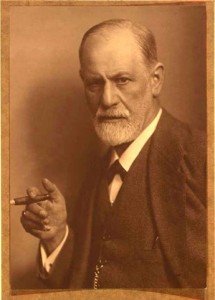- To Change Your Mind - Details Matter
Psychiatric Diagnosis: Brain Function Changes our Perspectives
Dyslexia, Brain, ADD and Irlen Syndrome: Scotopic Sensitivity Case Report
February 10, 2008The Neuroscience of Sexual Addiction: Carnes Leads the Way
March 1, 2008Diagnosis By Function, Beyond Labels
When I began training in psychiatry, back in 1969, much of the diagnostic psychiatric world evolved from affect thinking: depression and anxiety, euphoria, and emotionally based misperceptions of reality. In a word, we began with a Freudian, affect driven, trauma driven set of patterns. The most important mind-markers for diagnosis in those days: dreams and fantasies – the unconscious.
Freudian thinking, and careful observations of behaviors were all we had until modern technology arrived.
Today reality makes the difference.
Meeting Anna Freud
In fact, one of the highlights of my early training in Philadelphia was meeting Freud's daughter, Anna Freud, [the founder of child psychoanalysis] at the Philadelphia Association for Psychoanalysis after her interesting presentation on her book, Ego and the Mechanisms of Defense, hosted by the Association. [See her remarks on personal qualities of psychoanalysts, and you will understand more of my early interest.]
From Labels to Biomedical Function
Now functional brain science, SPECT, fMRI, qEEG, is changing the way we make brain and psychiatric diagnosis. With the understanding of brain function we inevitably change the way we think about the patient in the room… the way we actually make the diagnosis.
These are interesting contemporary comments by Harvard Professor John Ratey from a User's Guide to the Brain:
“The transition from trauma to biology has unfortunately failed to wean clinicians from affect-centered diagnosis. If you are unhappy and decide to seek help, the main thrust of the diagnostic process begins with an inquiry into how you feel. From this initial information, diagnosis and treatment proceed, as a rule, by either sifting through your psyche for sources of guilt, anger, or unfulfilled longing, or by attempting to modify the affective symptoms pharmacologically, or both.”
And for an edgy bit more, read on:
“The entire approach here is, in my opinion, quite misguided. Many brain disorders, particularly those that produce deficits in perception and cognition, can turn the lives of patients into abject misery. Historically virtually all metal disorders were associated with character flaws…. leaving enough residual confusion to feel ashamed of psychological shortcomings.”
The world has changed considerably in these last few years. Ratey does a great job of discussing the science in layman's terms so that anyone can begin to see the profound impact of the new science on diagnosis and treatment.
Further Insights On Psychiatric Diagnosis
And Ratey is not alone. See this esteemed collection of Critical Thinkers who regularly report on the need for more informed, more biomedically based brain and body diagnosis: CoreSight Critical Thinkers.
cp
Dr Charles Parker
Connect & Subscribe To CorePsych News: This Link
Connect & Subscribe For YouTube Updates: This Link
Complimentary & New: 25 pg Special Report: Predictable Solutions For ADHD Medications
Related articles by Zemanta









3 Comments
[…] neuroscience. Our current understandings of biologic mind complexity now stretch far beyond those early days of dreams and fantasies in the mid 20th century. Yes, we’re still using those outdated criteria, while coincidentally […]
Hi Charles.
I have managed to watch a few of your informative videos and I was curious to read what you were saying about brain function.
I am wondering where you stand on the neuroscience on brain plasticity? I am very hopeful that psychotherapeutic such as the talking ones, can make important functional changes in the brain of another.
What excites me about the neuroscience is just how interconnected we are to each other. Science tells us we are wired up to effect each other and assist in a multitude of functions.
Science is telling us that the processes of affect regulation and organizing ones reality is very much interwoven with significant others (including therapist). It’s telling us function is malleable. Curious about your thoughts?
Best wishes Johanna
Johanna,
Sounds like you are interested in the deeper aspects of where neuroscience is going… BDNF and plasticity… and this book on the Brain that Changes Itself will give you much more interesting stuff to chew on than a mere comment back from my perch. Doidge is an interesting and clear writer with compelling new information for a person with your obvious intelligence and curiosity. Yes, our collective evolution is all about malleable brain functions. Just did an interesting post with a great talk on the subject of collaboration.
cp